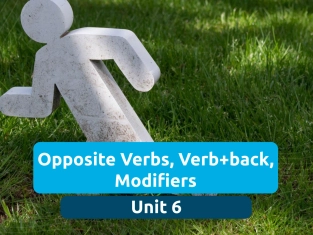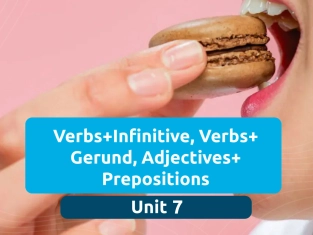by PushtoLearn
Unit 8 - Get, Confusing Verbs, Adverbs of Manner
Table of Contents
Unit 8, English File Pre-Intermediate 4th - Exercises and Flashcards
These exercises focus on Unit 8, English File Pre-Intermediate 4th
Wordlist for Unit 8, English File Pre-Intermediate 4th
|
Word |
Example |
|
get a job |
I want to get a job when I finish school. |
|
get a message |
Did you get a message from him? |
|
get a newspaper |
I went to get a newspaper this morning. |
|
get a present |
I need to get a present for my mum. It's her birthday next week. |
|
get a ticket |
You need to get a ticket before you get on the bus. |
|
get an email |
I get an email from my mum every week. |
|
get angry |
I try not to get angry , but it happens. |
|
get better |
I hope I get better next week. I want to go back to work. |
|
get colder |
Is it going to get colder next week? |
|
get divorced |
Why did you get divorced ? - I didn't get on with my wife. |
|
get fit |
I want to get fit so I feel healthier. |
|
get home |
I get home at 5.00 p.m. most days. |
|
get lost |
We get lost every time you drive! |
|
get married |
We are going to get married next year. |
|
get nervous |
I get nervous before tests. |
|
get on well with |
I get on well with my wife's parents. |
|
get to school |
I get to school at 8.00 a.m. every morning. |
|
get to work |
I get to work at 9.00 a.m. every morning. |
|
get up |
What time do you get up in the morning? |
|
get worse |
Why did my mark get worse? |
|
get a prize |
Did you get a prize for winning the competition? |
|
get into (out of) a car |
Get into the car . I'll be ready in two minutes. |
|
get on (off) a bus |
Get on a number 2 bus to the city centre. |
|
get ready |
Please get ready for college. You'll be late! |
|
borrow money from somebody |
I'll need to borrow money from my parents. I don't have enough. |
|
bring your dictionary / something back from holiday |
Bring your dictionary to class next week, please. |
|
carry a bag / a baby |
I carry a bag to work every day. |
|
earn a salary / money |
She's a student but she has a part-time job to earn money. |
|
find your glasses / a job |
I hope I'll find a job soon. |
|
hope that something good will happen / to do something |
This year has been terrible. I hope that something good will happen soon. |
|
know somebody well / something |
I know something about her that is quite surprising. |
|
lend money to somebody |
I always lend money to you and you never give it back. |
|
look at a photo / your watch |
Look at your watch . We're going to be late! |
|
look for your glasses / a job |
Shall I help you look for your glasses? |
|
look happy / about 25 years old |
You don't look 30. You look about 25 years old. |
|
look like your mother / a model |
You look like your mother, not your father. |
|
lose your glasses / a match |
What's the matter? Did you lose your glasses? |
|
meet somebody for the first time / at 11 o'clock |
Let's meet at 11 o'clock outside the school. |
|
miss the bus / a class |
We're a bit late. Did we miss the bus? |
|
say something to somebody / sorry / hello |
Say hello to Colin for me. |
|
take an umbrella / your children to school |
You should take an umbrella because it's going to rain. |
|
tell somebody something / a lie / a joke |
Do you think it's ever OK to tell a lie? |
|
wait for a bus / for a long time |
I'm going to wait for a bus. It's too far to walk. |
|
watch TV / a match |
Let's watch TV. There's a good film on. |
|
wear clothes / jewellery |
I'm not allowed to wear jewellery to work. |
|
win a prize / a match / a medal |
Do you win a prize or is it just for fun? |
|
expect |
I expect to go to university. |
|
hear a noise/ the doorbell |
Did you hear a noise? I'm sure I heard something. |
|
listen to music/ the radio |
In the evenings, I usually listen to music. |
|
angrily |
"Give it back!" she said angrily. |
|
lazily |
The cat sat lazily in the sun. |
|
quietly |
He walked through the house quietly. Everyone was asleep. |
|
sadly |
"We can't afford to go on holiday", he said sadly. |
|
seriously |
"This is important", she told me seriously. |
|
slowly |
I saw an old man walking his dog slowly. |
|
advantage |
The advantage of not having a car is that it saves a lot of money. |
|
suburb |
I don't live in the city centre – I live in the suburbs. |
|
trust |
He's very honest, and I completely trust him. |
|
suspicious |
Hartley was suspicious that Vivienne loved another man. |
|
masterfully |
"Vivienne," said Hartley, masterfully. "You must be mine." |

Featured Topics for Unit 8
Get
Get (verb)
-
Definition: To obtain, receive, or become.
-
Example: She wants to get a new laptop for her birthday.
-
Explanation: "Get" is a versatile verb that can mean acquiring, receiving, or changing state depending on context.
Get along (phrasal verb)
-
Definition: To have a good relationship with someone.
-
Example: They get along well despite their differences.
-
Explanation: Useful when talking about relationships or compatibility.
Get up (phrasal verb)
-
Definition: To rise from bed or a seated position.
-
Example: I usually get up at 7 a.m. for work.
-
Explanation: Commonly used when discussing daily routines.
Confusing Verbs
Lend (verb)
-
Definition: To give something temporarily to someone, expecting it to be returned.
-
Example: Can you lend me your book for a week?
-
Explanation: Knowing "lend" helps clarify the act of giving something on a temporary basis.
Borrow (verb)
-
Definition: To take something temporarily from someone, with the intention of returning it.
-
Example: I borrowed a jacket from my friend because it was cold.
-
Explanation: Often confused with "lend," but it refers to the opposite action.
Raise (verb)
-
Definition: To lift something or increase its level.
-
Example: They raised the price of tickets last month.
-
Explanation: Helps express actions involving lifting or increasing.
Rise (verb)
-
Definition: To move upward or increase naturally.
-
Example: The sun rises at 6 a.m. during summer.
-
Explanation: Different from "raise," as "rise" does not require a direct object.
Adverbs of Manner
Quickly (adverb)
-
Definition: At a fast speed.
-
Example: She quickly finished her homework before dinner.
-
Explanation: "Quickly" describes the speed of an action, adding precision to communication.
Carefully (adverb)
-
Definition: In a way that avoids mistakes or harm.
-
Example: He carefully checked his answers before submitting the test.
-
Explanation: Useful for expressing caution or thoroughness.
Loudly (adverb)
-
Definition: In a way that produces a lot of noise.
-
Example: The children laughed loudly at the funny joke.
-
Explanation: Adds detail to describe sound levels in a scene.
FAQ
What is the difference between "get" and "get up"?
"Get" can mean to obtain, receive, or become, while "get up" specifically refers to rising from bed or a seated position.
How do I avoid confusing "lend" and "borrow"?
Think of "lend" as giving temporarily and "borrow" as taking temporarily. For example, "I lend to you, and you borrow from me."
When should I use "raise" instead of "rise"?
Use "raise" when there’s a direct object (e.g., "She raised her hand"). Use "rise" when there’s no direct object (e.g., "The sun rises").
How can I form adverbs of manner?
Many adverbs of manner are formed by adding "-ly" to an adjective (e.g., quick → quickly, careful → carefully). However, some adverbs, like "fast," do not follow this pattern.
Are adverbs of manner always placed after the verb?
Adverbs of manner are typically placed after the verb or verb phrase (e.g., "She runs quickly"). However, for emphasis, they can sometimes come at the beginning of a sentence (e.g., "Quickly, she finished her task").

